Fleurs du Mal Magazine


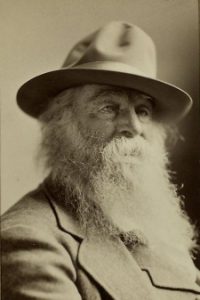
I Dream’d In A Dream
I dream’d in a dream,
I saw a city invincible to the attacks
of the whole of the rest of the earth;
I dream’d that was the new City of Friends;
Nothing was greater there than the quality
of robust love – it led the rest;
It was seen every hour in the actions
of the men of that city,
And in all their looks and words.
Walt Whitman
(1819 – 1892)
I Dream’d In A Dream
• fleursdumal.nl magazine
More in: Archive W-X, Archive W-X, Whitman, Walt
Harvest Lingo is the fourteenth collection of poems by Lionel Fogarty, a Murri man with traditional connections to the Yugambeh people from south of Brisbane and the Kudjela people of north Queensland.
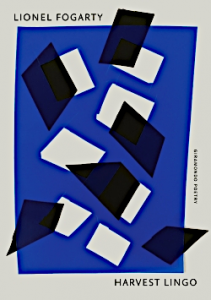 He is a leading Indigenous rights activist, and one of Australia’s foremost poets, and this collection displays all of the urgency, energy and linguistic audacity for which Fogarty is known.
He is a leading Indigenous rights activist, and one of Australia’s foremost poets, and this collection displays all of the urgency, energy and linguistic audacity for which Fogarty is known.
At the centre of the collection is a series of poems written in India. Deeply empathetic, these poems are remarkable for the connections they draw between the social problems the poet encounters in this country – poverty, class division, corruption – and those he sees in contemporary Australia, besetting his own people.
Other poems tell of encounters between people and between cultures, address historical and cultural issues and political events, and pay tribute to important Indigenous figures. There are intensely felt lyrics of personal experience, and poems which contemplate Fogarty’s own position as a poet and an activist, speaking with and for his community.
Fogarty’s poems are bold and fierce, at times challenging and confronting, moved by strong rhythms and a remarkable freedom with language. They are an expression of the ‘harvest lingo’ which gives the collection its title.
Lionel Fogarty was born on Wakka Wakka land, at Cherbourg Aboriginal Reserve in south-east Queensland in 1957. Throughout the 1970s he worked as an activist for Aboriginal Land Rights, and in the 1990s, after the death of his brother Daniel Yock, protesting against Aboriginal Deaths in Custody. His poetry collections date from the early 1980s; his most recent collections are Connection Requital; Mogwie-Idan: Stories of the Land; Eelahroo (Long Ago) Nyah (Looking) Mobo-Mobo (Future), all with Vagabond Press, and Lionel Fogarty: Selected Poems 1980-2017, published by re.press.
Harvest Lingo
by Lionel Fogarty
Poetry
Giramondo Publishing
112 pages
Paperback, 21 x 14.8 cm
Published June 2022
ISBN 9781925336177
$25,00
• fleursdumal.nl magazine
More in: #Editors Choice Archiv, - Book News, - Bookstores, Archive E-F, Archive E-F, Black Lives Matter, Racism
In this engaging book, the internationally best-selling author and famously private writer Haruki Murakami
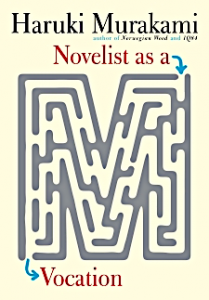 shares with readers his thoughts on the role of the novel in our society; his own origins as a writer; and his musings on the sparks of creativity that inspire other writers, artists, and musicians.
shares with readers his thoughts on the role of the novel in our society; his own origins as a writer; and his musings on the sparks of creativity that inspire other writers, artists, and musicians.
Here are the personal details of a life devoted to craft: the initial moment at a Yakult Swallows baseball game, when he suddenly knew he could write a novel; the importance of memory, what he calls a writer’s “mental chest of drawers”; the necessity of loneliness, patience, and his daily running routine; the seminal role a carrier pigeon played in his career.
Aspiring writers and readers who have long wondered where the mysterious novelist gets his ideas and what inspires his strangely surreal worlds will be fascinated by this insightful and unique look at the craft of writing and into the mind of a master storyteller.
Haruki Murakami was born in Kyoto in 1949 and now lives near Tokyo. His work has been translated into more than fifty languages, and one of the most recent of his many international honors is the Cino Del Duca World Prize, whose previous recipients include Jorge Luis Borges, Ismail Kadare, Mario Vargas Llosa, and Joyce Carol Oates.
Novelist as a Vocation
The master storyteller on writing and creativity
Haruki Murakami
Philip Gabriel (Translator)
Ted Goossen (Translator)
Published: 08/11/2022
Publisher: Knopf (November 8, 2022)
Language: English
Hardcover: 224 pages
ISBN-10: 0451494644
ISBN-13: 978-0451494641
$22.99
•fleursdumal.nl magazine
More in: - Book News, - Bookstores, Archive M-N, Haruki Murakami
Ein solches Buch hat es noch nie gegeben.
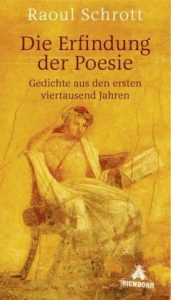 Dass die Poesie eine alte Erfindung ist, ahnen wir; aber die wenigsten von uns wären imstande, die Spur der europäischen Dichtung bis an ihre Ursprünge zurückzuverfolgen.
Dass die Poesie eine alte Erfindung ist, ahnen wir; aber die wenigsten von uns wären imstande, die Spur der europäischen Dichtung bis an ihre Ursprünge zurückzuverfolgen.
Sie führt weit, bis ins Zweistromland, bis zu den Arabern, den Kelten und den Sizilianern. Wer wüßte schon, daß der älteste überlieferte Dichtername einer Frau gehört?
Wer kennt noch die wilden Lieder des Archilochos, den die Griechen die Skorpionzunge nannten?
Und so weiter – über Sappho und die römischen Elegiker Catull und Properz bis zu den Iren des achten, den Hebräern des elften, den Trobadors des zwölften und den Walisern des vierzehnten Jahrhunderts.
Raoul Schrott ist 1964 in Landeck geboren. Seine bisherigen Publikationen sind: Dada 21/22 (1988); Makama (1989); Die Legenden vom Tod (1990); Rime (1991); Dada 15/25 (1992); Sub rosa (1993); Hotels (1995); Finis terrae (1995), Die Musen. Fragmente einer Sprache der Dichtung (1997) und Poesie und Physis – Grazer Poetikvorlesungen (1997).
Schrott, Raoul
Die Erfindung der Poesie
Die Andere Bibliothek u.a.
Seitenanzahl: 536
Extradrucke
Bandnummer: 154
ISBN: 9783821847702
ca. 45,00 EUR (antiquarisch)
• fleursdumal.nl magazine
More in: - Book Lovers, - Bookstores, Archive S-T, The Art of Reading
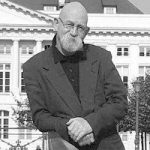
Alles moet
Verblij me met het lijmen van tijden. Hoe
leven wonderschoon zich aan de mens gewoon
perfect voltrekt als alles goed gaat. Door denken
aan. Want alles moet. Niets gebeurt zomaar.
Zet aan het leven! Niets mis is er mee. Het is of
Fellini met een handycam achter ons loopt. Zo
Bert Bevers
Alles moet
Gedicht ongepubliceerd
• fleursdumal.nl magazine
More in: Archive A-B, Archive A-B, Bevers, Bert

Tegemoet
Als lange neus naar zware, logge
aangemeerden langs de kade
zoeft lichtgewicht ze vliegensvlug voorbij
te recht en strak om dobberend dier te zijn
niet in harmonie met kwetterende eenden
ook niet met de tetterende fietser vlak daarnaast.
Acht peddels links, acht peddels rechts
daartussenin bewegen acht gesmeerde mannen
ritmisch met hun sterke armen mee tot één geheel.
Vlak voor brug worden zij rietstengels, die buigen,
niet door wind maar laagste ijzer van de brug is hard
van bovenaf kijk ik één tel op rij gezichten neer
als stille, stoere streep gaan zij in al hun pracht ten onder.
Freda Kamphuis
Tegemoet
Gedicht
• fleursdumal.nl magazine
More in: Archive K-L, Archive K-L, Kamphuis, Freda
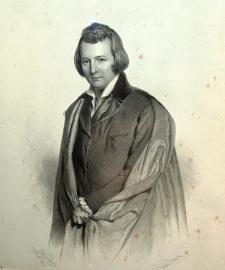
Im süßen Traum,
bei stiller Nacht
Im süßen Traum, bei stiller Nacht,
Da kam zu mir, mit Zaubermacht,
Mit Zaubermacht, die Liebste mein,
Sie kam zu mir ins Kämmerlein.
Ich schau sie an, das holde Bild!
Ich schau sie an, sie lächelt mild,
Und lächelt, bis das Herz mir schwoll,
Und stürmisch kühn das Wort entquoll:
»Nimm hin, nimm alles, was ich hab,
Mein Liebstes tret ich gern dir ab,
Dürft ich dafür dein Buhle sein,
Von Mitternacht bis Hahnenschrein.«
Da staunt’ mich an gar seltsamlich,
So lieb, so weh und inniglich,
Und sprach zu mir die schöne Maid:
»Oh, gib mir deine Seligkeit!«
»Mein Leben süß, mein junges Blut,
Gäb ich, mit Freud’ und wohlgemut,
Für dich, o Mädchen, engelgleich –
Doch nimmermehr das Himmelreich.«
Wohl braust hervor mein rasches Wort,
Doch blühet schöner immerfort,
Und immer spricht die schöne Maid:
»Oh, gib mir deine Seligkeit!«
Dumpf dröhnt dies Wort mir ins Gehör,
Und schleudert mir ein Glutenmeer
Wohl in der Seele tiefsten Raum;
Ich atme schwer, ich atme kaum. –
Das waren weiße Engelein,
Umglänzt von goldnem Glorienschein;
Nun aber stürmte wild herauf
Ein gräulich schwarzer Koboldhauf’.
Die rangen mit den Engelein,
Und drängten fort die Engelein;
Und endlich auch die schwarze Schar
In Nebelduft zerronnen war. –
Ich aber wollt in Lust vergehn,
Ich hielt im Arm mein Liebchen schön;
Sie schmiegt sich an mich wie ein Reh,
Doch weint sie auch mit bitterm Weh.
Feins Liebchen weint; ich weiß warum,
Und küß ihr Rosenmündlein stumm. –
»O still, feins Lieb, die Tränenflut,
Ergib dich meiner Liebesglut!
Ergib dich meiner Liebesglut-«
Da plötzlich starrt zu Eis mein Blut;
Laut bebet auf der Erde Grund,
Und öffnet gähnend sich ein Schlund.
Und aus dem schwarzen Schlunde steigt
Die schwarze Schar; – feins Lieb erbleicht!
Aus meinen Armen schwand feins Lieb;
Ich ganz alleine stehenblieb.
Da tanzt im Kreise wunderbar,
Um mich herum, die schwarze Schar,
Und drängt heran, erfaßt mich bald,
und gellend Hohngelächter schallt.
Und immer enger wird der Kreis,
Und immer summt die Schauerweis’:
»Du gabest hin die Seligkeit,
Gehörst uns nun in Ewigkeit!«
Heinrich Heine
(1797-1856)
Im süßen Traum, bei stiller Nacht
• fleursdumal.nl magazine
More in: Archive G-H, Archive G-H, Heine, Heinrich
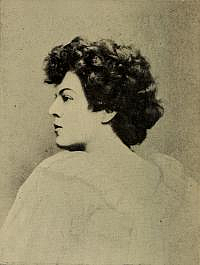
Sick I am and sorrowful
Sick I am and sorrowful, how can I be well again
Here, where fog and darkness are, and big guns boom all day,
Practising for evil sport? If you speak humanity,
Hatred comes into each face, and so you cease to pray.
How I dread the sound of guns, hate the bark of musketry,
Since the friends I loved are dead, all stricken by the sword.
Full of anger is my heart, full of rage and misery;
How can I grow well again, or be my peace restored?
If I were in Glenmalure, or in Enniskerry now,
Hearing of the coming spring in the pinetree’s song;
If I woke on Arran Strand, dreamt me on the cliffs of Moher,
Could I not grow gay again, should I not be strong?
If I stood with eager heart on the heights of Carrantuohill,
Beaten by the four great winds into hope and joy again,
Far above the cannons’ roar or the scream of musketry,
If I heard the four great seas, what were weariness or pain?
Were I in a little town, Ballybunion, Ballybrack,
Laughing with the children there, I would sing and dance once more,
Heard again the storm clouds roll hanging over Lugnaquilla,
Built dream castles from the sands of Killiney’s golden shore.
If I saw the wild geese fly over the dark lakes of Kerry
Or could hear the secret winds, I could kneel and pray.
But ’tis sick I am and grieving, how can I be well again
Here, where fear and sorrow are—my heart so far away?
Dora Maria Sigerson Shorter
(1866 – 1918)
Sick I am and sorrowful
• fleursdumal.nl magazine
More in: Archive S-T, Archive S-T, Sigerson Shorter, Dora Maria, WAR & PEACE
Ingeborg Bachmann geldt als een van de belangrijkste schrijvers van de twintigste eeuw.
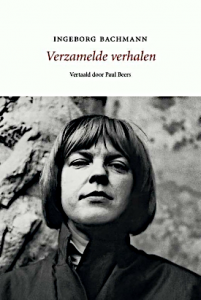 De stoutmoedigheid van de taal, de scherpte van haar inzicht en de energie van het gevoel vormen vanaf het begin de onverwisselbare eigenheid van haar proza.
De stoutmoedigheid van de taal, de scherpte van haar inzicht en de energie van het gevoel vormen vanaf het begin de onverwisselbare eigenheid van haar proza.
Het laat mensen zien op het kruispunt van hun bestaan, vóór er ingrijpende beslissingen worden genomen.
Verzamelde verhalen bevat de bundel Het dertigste jaar, met de nadruk op het intellect, en de tien jaar later na een ernstige crisis gepubliceerde bundel Simultaan, met de nadruk op gevoel en liefde.
Daarnaast is de nooit eerder vertaalde vroege bundel Het veer opgenomen met een grote variatie aan onderwerpen.
Verzamelde verhalen
Auteur: Ingeborg Bachmann
Taal: Nederlands
Vertaling: Paul Beers
Uitgeverij Koppernik
Hardcover
Oorspronkelijke releasedatum
04 februari 2021
Aantal pagina’s: 504
EAN 9789083089850
€ 29.90
• fleursdumal.nl magazine
More in: - Book News, - Bookstores, Archive A-B, Archive A-B, Bachmann, Ingeborg, Celan, Paul
In her English-language debut, acclaimed French-language poet of the Palestinian diaspora Olivia Elias probes deeply into the upheavals of the twentieth and twenty-first centuries
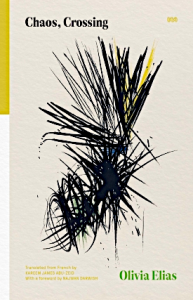 Poet of the Palestinian diaspora, born in Haifa in 1944, Olivia Elias writes in French. She lived until she was 16 years old in Lebanon where her family took refuge in 1948, then in Montréal-Canada, before moving to France.
Poet of the Palestinian diaspora, born in Haifa in 1944, Olivia Elias writes in French. She lived until she was 16 years old in Lebanon where her family took refuge in 1948, then in Montréal-Canada, before moving to France.
Her third and most recent collection, Chaos, Traversée, appeared in 2019. Characterized by terse, laconic language and strong rhythms, her poetry shows a deep sensitivity to the Palestinian cause, the plight of refugees and human suffering in general.
Her work, translated into English, Arabic, Spanish, Italian and Japanese, has been published in numerous journals and in anthologies.
Kareem James Abu-Zeid is a translator of writers from across the Arab world, including Najwan Darwish (Palestine), Adonis (Syria), Rabee Jaber (Lebanon), and Dunya Mikhail (Iraq). He has received an NEA translation grant, PEN Center USA’s Translation Award, a Fulbright Fellowship (Germany), and a CASA Fellowship (Egypt), among other honors. He is also the author of The Poetics of Adonis and Yves Bonnefoy: Poetry as Spiritual Practice.
Chaos, Crossing —translated by award-winning translator Kareem James Abu-Zeid—is a powerful chronicle of uprootedness, of times marked by inequality, injustice, and disconnection. These poems—presented here in a bilingual edition—seek the calm at the center of the storm, the still point amidst the chaos.
Chaos, Crossing
Olivia Elias (Author)
Kareem James Abu-Zeid (Translator)
Foreword by Najwan Darwish
Pub Date: 11/15/2022
Publisher: World Poetry Books
Product Number:9781954218079
ISBN978-1-954218-07-9
Binding: Paperback
Pages: 192
Price: $ 20.00
• fleursdumal.nl magazine
More in: #Editors Choice Archiv, - Book News, - Bookstores, Archive E-F, Archive E-F

Deutschland.
Ein Wintermärchen
Im traurigen Monat November war’s,
Die Tage wurden trüber,
Der Wind riß von den Bäumen das Laub,
Da reist ich nach Deutschland hinüber.
Und als ich an die Grenze kam,
Da fühlt ich ein stärkeres Klopfen
In meiner Brust, ich glaube sogar
Die Augen begunnen zu tropfen.
Und als ich die deutsche Sprache vernahm,
Da ward mir seltsam zumute;
Ich meinte nicht anders, als ob das Herz
Recht angenehm verblute.
Ein kleines Harfenmädchen sang.
Sie sang mit wahrem Gefühle
Und falscher Stimme, doch ward ich sehr
Gerühret von ihrem Spiele.
Sie sang von Liebe und Liebesgram,
Aufopfrung und Wiederfinden
Dort oben, in jener besseren Welt,
Wo alle Leiden schwinden.
Sie sang vom irdischen Jammertal,
Von Freuden, die bald zerronnen,
Vom Jenseits, wo die Seele schwelgt
Verklärt in ew’gen Wonnen.
Sie sang das alte Entsagungslied,
Das Eiapopeia vom Himmel,
Womit man einlullt, wenn es greint,
Das Volk, den großen Lümmel.
Ich kenne die Weise, ich kenne den Text,
Ich kenn auch die Herren Verfasser;
Ich weiß, sie tranken heimlich Wein
Und predigten öffentlich Wasser.
Ein neues Lied, ein besseres Lied,
O Freunde, will ich euch dichten!
Wir wollen hier auf Erden schon
Das Himmelreich errichten.
Wir wollen auf Erden glücklich sein,
Und wollen nicht mehr darben;
Verschlemmen soll nicht der faule Bauch,
Was fleißige Hände erwarben.
Es wächst hienieden Brot genug
Für alle Menschenkinder,
Auch Rosen und Myrten, Schönheit und Lust,
Und Zuckererbsen nicht minder.
Ja, Zuckererbsen für jedermann,
Sobald die Schoten platzen!
Den Himmel überlassen wir
Den Engeln und den Spatzen.
Und wachsen uns Flügel nach dem Tod,
So wollen wir euch besuchen
Dort oben, und wir, wir essen mit euch
Die seligsten Torten und Kuchen.
Ein neues Lied, ein besseres Lied!
Es klingt wie Flöten und Geigen!
Das Miserere ist vorbei,
Die Sterbeglocken schweigen.
Die Jungfer Europa ist verlobt
Mit dem schönen Geniusse
Der Freiheit, sie liegen einander im Arm,
Sie schwelgen im ersten Kusse.
Und fehlt der Pfaffensegen dabei,
Die Ehe wird gültig nicht minder –
Es lebe Bräutigam und Braut,
Und ihre zukünftigen Kinder!
Ein Hochzeitkarmen ist mein Lied,
Das bessere, das neue!
In meiner Seele gehen auf
Die Sterne der höchsten Weihe –
Begeisterte Sterne, sie lodern wild,
Zerfließen in Flammenbächen –
Ich fühle mich wunderbar erstarkt,
Ich könnte Eichen zerbrechen!
Seit ich auf deutsche Erde trat,
Durchströmen mich Zaubersäfte –
Der Riese hat wieder die Mutter berührt,
Und es wuchsen ihm neu die Kräfte.
Heinrich Heine
(1797-1856)
Deutschland. Ein Wintermärchen
• fleursdumal.nl magazine
More in: 4SEASONS#Winter, Archive G-H, Archive G-H, Heine, Heinrich

Baignée
Un fruit de chair se baigne en quelque jeune vasque,
(Azur dans les jardins tremblants) mais hors de l’eau,
Isolant la torsade aux puissances de casque,
Luit le chef d’or que tranche à la nuque un tombeau.
Éclose la beauté par la rose et l’épingle !
Du miroir même issue où trempent ses bijoux,
Bizarres feux brisés dont le bouquet dur cingle
L’oreille abandonnée aux mots nus des flots doux.
Un bras vague inondé dans le néant limpide
Pour une ombre de fleur à cueillir vainement
S’effile, ondule, dort par le délice vide,
Si l’autre, courbé pur sous le beau firmament,
Parmi la chevelure immense qu’il humecte,
Capture dans l’or simple un vol ivre d’insecte.
Paul Valéry
(1871-1945)
Baignée
Poème
Album de vers anciens
• fleursdumal.nl magazine
More in: Archive U-V, Archive U-V, Valéry, Paul
Thank you for reading Fleurs du Mal - magazine for art & literature